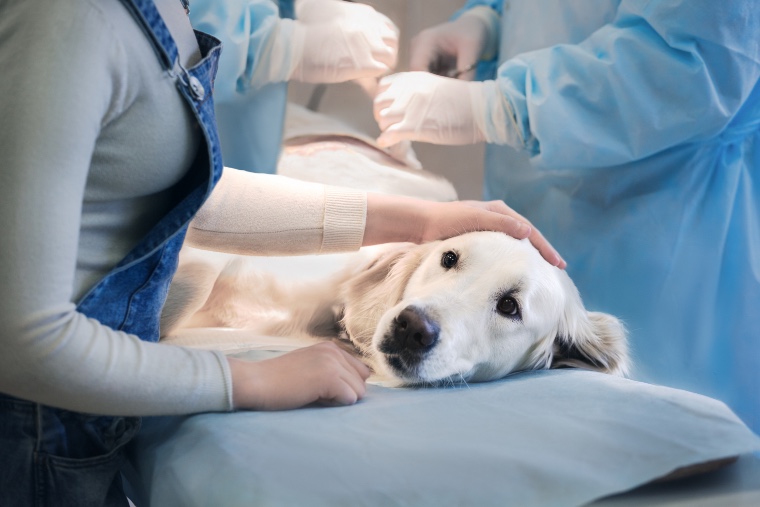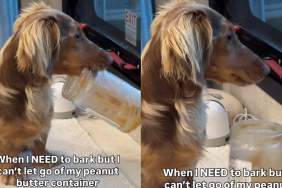Our fur babies are our beloved companions. We go above and beyond to ensure their safety, happiness, and well-being. Despite our acts of love to protect our pups from harm, unintentional consumption of household items can lead to poisoning in dogs. While it is already common knowledge that items like chocolate, cleaners, and pesticides can cause great harm to our pups, what else is lurking within arm’s reach? March is Pet Poison Prevention Month. We’ve compiled a list of top household items that can cause poisoning in dogs.
Xylitol
Xylitol, also known as birch sugar, can appear as one of those confusing ingredients listed on the back of a wrapper or label. The sweetener is a natural sugar alcohol substance found in plants. Nearly sweet as sucrose (sugar), Xylitol is low in calories and sugar. This makes it a choice sweetener option for people with diabetes or those who are on low-carbohydrate diets. Despite how often the ingredient is used in sugar-free items, the substance is incredibly toxic to dogs. According to the U.S. Food and Drug Administration (FDA), when dogs ingest something containing xylitol, the substance is more quickly absorbed into the bloodstream. This can lead to a potent release of insulin from the pancreas.
Poisoning can begin in as little as 20 minutes. Even small amounts can cause hypoglycemic (low blood sugar), liver failure, seizures, and even death. Ingesting over .5 grams of Xylitol can lead to liver failure. For reference, one stick of chewing gum contains between .5 and 1g of Xylitol.
Be extra mindful about leaving out mints, gum, candy, or other items containing xylitol. The ingredient is found in a wide range of sugar-free and low-sugar food and health products including:
- Chapstick
- Gum and mints
- Baked Goods, Ice Cream, or Desserts
- Jellies and nut butters
- Candy
- Mouthwash and toothpaste
- Cough syrup and nasal sprays
- Dietary supplements like gummy vitamins or sleep aids
An additional preventative measure would be to read the ingredient list to ensure that it does not contain a toxic substance. Instead, purchase an alternative option that is not toxic or potentially fatal. Stevia, Monk Fruit, Sucralose (Splenda), even the popular Erythritol – not to be confused with Xylitol! – are sugar-free options that are not toxic to our canine friends.
Batteries
Household batteries contain toxic chemicals that can be released upon puncture. Ingesting the chemicals can require emergency treatment from a veterinarian. When alkaline batteries leak, they can burn your pet’s mouth, stomach, or esophagus. Swallowing an entire battery can lead to intestinal blockage, which may require surgery.
Serious injury can occur within a few hours of the battery being swallowed. If you notice your pup got ahold of your television remote or your child’s toy, make sure to check that the batteries are in place. Additionally, you may want to inspect your pup’s mouth for burns or signs of ingestion. If you suspect your dog may have swallowed a battery, contact your veterinarian immediately.
Grapes, raisins, currants, sultanas
We’ve all shared our human snacks with our pups, even against veterinarian advice. Carrots, small amounts of turkey, natural peanut butter are all options that are safe for our dogs. Grapes, raisins, currants, and sultanas are a treat to enjoy alone and should never be shared with your fur baby. The ASPCA Poison Control Center (PCC) determined that these foods contain tartaric acid, a compound that causes vomiting, diarrhea, and in serious cases, kidney failure.
Garlic and onions
Garlic and onions contain a toxic component known as N-propyl disulfide. Consuming any part of onion or garlic can cause anemia in dogs. Onion and garlic powder is used in a wide range of food, from pasta sauce to baby food. It does not take a lot for a medium-sized dog to experience side effects from dangerous toxicity levels. Small dogs are even more susceptible. Because of how often we use onion, garlic, and their powdered forms in our food, it is important to monitor storage and use. The flavor is enticing to dogs, which makes this an additional concern.
Baking soda, baking powder, cream of tartar
Similar to grapes, cream of tartar contains tartaric acid that causes gastrointestinal and renal distress to dogs. In serious cases, dogs may die from acute kidney failure. The acid is also found in baking soda and baking powder, ingredients commonly used in cooking or baking. If you unknowingly drop a bit on the floor while baking, your dog may sniff at the powder or lick up the leftovers. This small action can have great consequences. Pet owners should mindful when using these ingredients when baking. The ingredient is also called for in homemade play-dough, which children could leave unattended to later be discovered by their furry siblings.
Dryer Sheets
Fabric softener sheets coat clothing with chemicals such as benzalkonium and chloroform in order to rid fabrics of static cling. Additionally, fragrances contain chemicals that are toxic to your pup. While there is no sure way to predict what your dog will find to chew on, your pup may be at risk for poisoning if that item is a dryer sheet. Even if the sheet has been used, it is still toxic to dogs. Poisoning can lead to gastrointestinal issues or intestinal blockages, but can also lead to nervous system breakdowns and difficulty breathing.
Over-the-counter and prescription medications
Many of us require the use of medications for a variety of ailments, from headaches, to allergies, to illness, or injury. It is important to properly store medication in order to avoid unintentional ingestion. If you believe you may have dropped a Tylenol on accident, be sure to pick it up. Consuming even one or two pills of a toxic drug can lead to devastating results. The National Animal Supplement Council identifies drugs that are highly toxic to pets. These include:
- Acetaminophen (Tylenol)
- Ibuprofen (Advil, Motrin)
- Naproxen (Aleve, Anaprox)
- Antidepressants
- ADD/ADHD Medication
- Sleep Aids (Benzodiazepines, Xanax, Ambien)
- Beta-Blockers
- Thyroid Hormones
- Cholesterol Medications (Lipitor)
Signs of poisoning in dogs
Signs of pet poisoning can vary depending on the type of toxin and quantity of consumption. Some of the most common indications of poisoning in dogs include:
- Diarrhea and upset stomach
- Seizures
- Vomiting
- Dizziness
- Lethargy
- Loss of appetite
- Weakness
- Drooling
- Abnormal panting
- Excessive thirst or urination
If you suspect your pet may have ingested something toxic, immediately contact the National Poison Control Help Line at 1-800-222-1222. You can also text “POISON” to 797979.
Contact your veterinarian if you think your pet may have ingested something poisonous. Although we can downplay the level of severity when it comes to your pup eating something they shouldn’t have, it is always better to be safe. Time is of the essence when it comes to medical care following poisoning in dogs.









